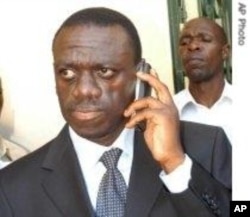Uganda’s leading opposition party – the Forum for Democratic Change – has elected Kizza Besigye as the party’s presidential candidate in next year’s elections.
Besigye overwhelmingly defeated his challenger Maj. Gen. Mugisha Muntu who gracefully conceded defeat following Thursday’s vote.
This would be the third time that Mr. Besigye will be contesting the presidency against incumbent President Yoweri Museveni who has ruled Uganda for almost a quarter of a century.
Besigye said Ugandan voters have many reasons not to vote for incumbent President Museveni.
“First of all there is no need on the part of any candidate to waste time on whether people should elect President Museveni. I think that is critically up to the electorate. He has been leading our country for a quarter of a century, the levels of poverty in the country, the level of corruption. In fact President Museveni can be summed up as a president for poverty and corruption,” he said.
Besigye said if elected, his FDC party would work to reduce corruption in government and stimulate the economy.
“We have, even in previous elections, projected the kind of policy agenda that certainly redirect our country. Basically an agenda that will deal with rampant and systemic corruption, an agenda that will reduce the burgeoning cost of public administration because the current regime is based on a patronage system. We will be projecting policies that will lead to the stimulation of our economy through having a lower tax regime,” he Besigye said.
He also said an FDC administration in Uganda would resume paying attention again on agriculture which he said has been neglected under President Museveni.
Besigye was defeated by President Museveni in the 2001 and 2006 elections.
He said the FDC has entered into a cooperation understanding with a loose group of five opposition parties.
“We have, over the last year been discussing cooperation amongst the main political opposition parties, especially those with representation in parliament, and we have already managed to establish a protocol for cooperation, including for selection of candidates,” Besigye said.
The Ugandan parliament has begun debating a number of proposals intended to reform the country’s electoral laws.
Besigye said the electoral playing field in Uganda has never been leveled, and he criticized President Museveni for reappointing members of the country’s controversial electoral commission.
“It’s also to be understood that President Museveni reappointed the electoral commissioner recently in spite the damning indictment by the courts of law that the current commission is partisan, biased and grossly incompetent,” he said..
Uganda is one of about 16 African countries that are scheduled to hold presidential elections in 2011, and Besigye said the only way Uganda can avoid a Kenya-type post-election violence is to institute meaningful electoral reforms.
“There is only one course and that is to undertake reforms that can engender an environment free of fear, intimidation, of violence and so forth,” he said.
Besigye said the FDC will be engaging Uganda’s neighbors, the African Union and the international community to apply whatever leverage they have on President Museveni to accept to undertake meaningful electoral reforms.




